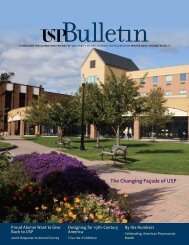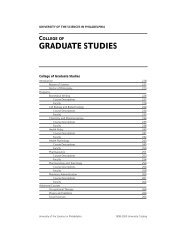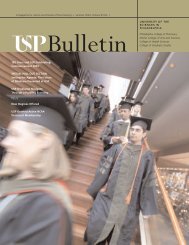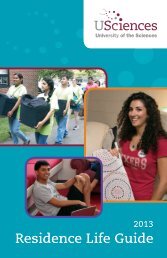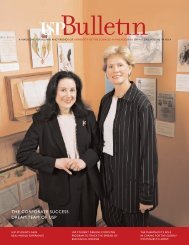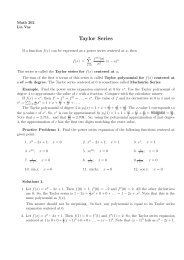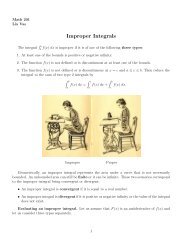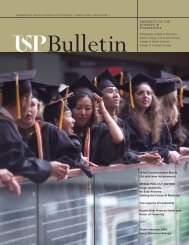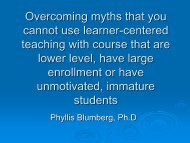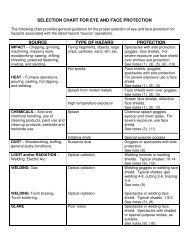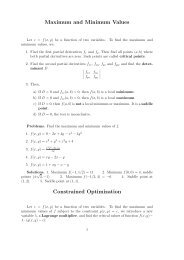USciences Bulletin - University of the Sciences in Philadelphia
USciences Bulletin - University of the Sciences in Philadelphia
USciences Bulletin - University of the Sciences in Philadelphia
You also want an ePaper? Increase the reach of your titles
YUMPU automatically turns print PDFs into web optimized ePapers that Google loves.
THE BULLETIN: THE STATE OF PERSONALIZED MEDICINE PAGE 9<br />
Our Own Personal 0.4 Percent and What to Do with It<br />
Experts ga<strong>the</strong>r to present <strong>the</strong> state <strong>of</strong> <strong>the</strong> personalized medic<strong>in</strong>e field<br />
By Kev<strong>in</strong> Kaufman<br />
Aim<strong>in</strong>g to shed some light on <strong>the</strong><br />
rapidly emerg<strong>in</strong>g, ever-chang<strong>in</strong>g,<br />
and heret<strong>of</strong>ore unknown field <strong>of</strong><br />
personalized medic<strong>in</strong>e, <strong>U<strong>Sciences</strong></strong>’<br />
Mayes College <strong>of</strong> Healthcare Bus<strong>in</strong>ess<br />
and Policy and <strong>the</strong> Program <strong>in</strong><br />
Personalized Medic<strong>in</strong>e and Targeted<br />
Therapeutics (P 2 MT 2 ) hosted an<br />
engag<strong>in</strong>g and <strong>in</strong>formative panel<br />
discussion <strong>in</strong> April. “Mak<strong>in</strong>g <strong>the</strong><br />
Connections: Personalized Medic<strong>in</strong>e—<br />
From Promise to Public Health and<br />
Policy” is part <strong>of</strong> an annual speaker<br />
series hosted by Mayes College and<br />
made possible by an unrestricted<br />
educational grant from AstraZeneca<br />
Pharmaceuticals.<br />
From left to right: The dist<strong>in</strong>guished panel <strong>in</strong>cluded moderator George E. Downs, PharmD;<br />
Amalia M. Issa, PhD, MPH; Michael F. Christman, PhD; and Stephen Kimmel, MD, MSCE.<br />
Field experts and panelists Stephen<br />
Kimmel, MD, MSCE; Michael<br />
Christman, PhD; and <strong>U<strong>Sciences</strong></strong>’<br />
AMALIA M. ISSA, PhD, MPH, who<br />
serves not only as director <strong>of</strong> <strong>the</strong><br />
Program <strong>in</strong> Personalized Medic<strong>in</strong>e and<br />
Targeted Therapeutics as well as chair<br />
<strong>of</strong> <strong>the</strong> Department <strong>of</strong> Health Policy and<br />
Public Health, <strong>in</strong>dividually addressed<br />
different aspects <strong>of</strong> <strong>the</strong> field. They<br />
<strong>the</strong>n took nearly an hour <strong>of</strong> <strong>in</strong>tense<br />
question<strong>in</strong>g from attendees.<br />
The National Institutes <strong>of</strong> Health def<strong>in</strong>es<br />
“personalized medic<strong>in</strong>e” as <strong>the</strong> “emerg<strong>in</strong>g<br />
practice <strong>of</strong> medic<strong>in</strong>e that uses an <strong>in</strong>dividual’s<br />
genetic pr<strong>of</strong>ile to guide decisions<br />
made with regard to <strong>the</strong> prevention, diagnosis,<br />
and treatment <strong>of</strong> disease.”<br />
Or, “<strong>the</strong> right medic<strong>in</strong>e for <strong>the</strong> right<br />
person at <strong>the</strong> right time,” stated<br />
Dr. Kimmel, a pr<strong>of</strong>essor <strong>of</strong> both<br />
medic<strong>in</strong>e and epidemiology at <strong>the</strong><br />
Perelman School <strong>of</strong> Medic<strong>in</strong>e at <strong>the</strong><br />
<strong>University</strong> <strong>of</strong> Pennsylvania. “It’s <strong>the</strong><br />
most appropriate <strong>the</strong>rapy to <strong>the</strong> most<br />
appropriate patient.”<br />
S<strong>in</strong>ce <strong>the</strong> human genome was first<br />
mapped <strong>in</strong> 2001, it’s been determ<strong>in</strong>ed<br />
that humans are more or less 99.6<br />
percent similar. It’s that 0.4 percent that<br />
makes us unique and determ<strong>in</strong>es height<br />
and aspects <strong>of</strong> our personality, along<br />
with <strong>the</strong> likelihood <strong>of</strong> gett<strong>in</strong>g breast<br />
cancer or <strong>the</strong> likelihood <strong>of</strong> respond<strong>in</strong>g<br />
to a drug, said Dr. Christman,<br />
president and CEO <strong>of</strong> Coriell Institute<br />
for Medical Research.<br />
In only 13 years <strong>of</strong> <strong>in</strong>tense study,<br />
knowledge has <strong>in</strong>creased dramatically,<br />
but researchers are still wrapp<strong>in</strong>g<br />
<strong>the</strong>ir arms around what exactly this<br />
knowledge can be used for. Progress<br />
has been slow but promis<strong>in</strong>g,<br />
accord<strong>in</strong>g to Dr. Kimmel.<br />
“Scientific progress doesn’t move all<br />
that fast. But genetics still has great<br />
potential to improve health,” said Dr.<br />
Kimmel. “I th<strong>in</strong>k it’s go<strong>in</strong>g to take<br />
time—some <strong>in</strong>novation and new ways<br />
<strong>of</strong> th<strong>in</strong>k<strong>in</strong>g, carefully done studies,<br />
<strong>in</strong>clud<strong>in</strong>g randomized trials—but more<br />
<strong>of</strong>ten than we are do<strong>in</strong>g now. And a lot<br />
<strong>of</strong> patience. It’s progress and promise,<br />
not hype and disappo<strong>in</strong>tment.<br />
“We’re not quite to <strong>the</strong><br />
po<strong>in</strong>t where we can go<br />
to a pharmacist and hand<br />
<strong>the</strong>m our DNA sequence<br />
for a prescription.”<br />
- Dr. Stephen Kimmel<br />
Cont<strong>in</strong>ued on page 10




